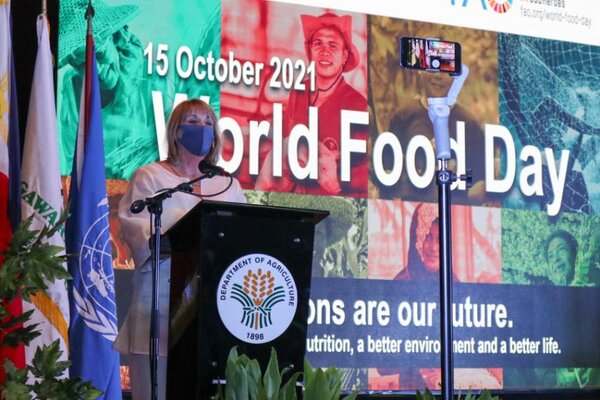Climate crisis driving hunger, warns WFP on World Food Day

“The climate crisis has the potential to overwhelm humanity. The world is not prepared for the unprecedented rise in hunger we will see if we do not invest in programs that help vulnerable communities adapt and build resilience to our changing climate,” said WFP Executive Director David Beasley. “The climate crisis is fuelling a food crisis.”
Vulnerable communities, a vast majority of whom rely on agriculture, fishing, and livestock, who contribute the least to the climate crisis, bear the brunt of the impacts with limited means to cushion the blow.
Building on this year’s theme for World Food Day, “Our actions are our future- better production, better nutrition, a better environment, and a better life”, WFP called on world leaders to recognise the close link between hunger and the climate crisis, urging them to redouble their efforts to address the changing climate in advance of the November 2021 United Nations Climate Change Conference in Glasgow (COP26).
“The climate crisis is a threat multiplier,” said Brenda Barton, WFP’s Representative and Country Director for the Philippines at yesterday’s World Food Day 2021 main event with the Department of Agriculture and the Food and Agriculture Organization (FAO). “We see this here in the Philippines where the nexus between high rates of malnutrition, repeated climate shocks, and now the COVID pandemic, has put more and more people’s food and nutrition security at risk.”
The Philippines ranks fourth among the countries most affected by climate risks over a 20-year period.
When typhoons and other shocks strike, nutrition worsens. According to a 2019 nutrition survey by the Department of Science and Technology-Food and Nutrition Research Institute, 64.1% of households are food insecure. Malnutrition rates in the Philippines, particularly stunting, remain high and are currently amongst the top ten worst in the world numerically. Almost 30 percent of children under five too short for their age. This has a negative, lifelong impact on children’s physical and cognitive development, and consequently, the country’s future human capital.
WFP works with the Philippine Government to support needed agriculture interventions, and innovative climate-related initiatives including anticipatory actions to mitigate the severe impact of typhoons and other shocks when they do occur. WFP provides cash and other assets to thousands of farming and fishing communities to provide sustainable livelihoods and improve their resilience to climate shocks. In addition, WFP works with the government in its advocacy to promote the production and consumption of iron-fortified rice to directly reduce stunting cases.
“We must urgently act and act collectively, using innovative ways to manage climate risks and to protect vulnerable communities -- especially the farming and fishing sectors on whom we rely to produce the very food we eat every day,” said Barton.
# # #
World Food Programme is the world’s largest humanitarian organization, saving lives in emergencies, building prosperity, and supporting a sustainable future for people recovering from conflict, disasters, and the impact of climate change. WFP in the Philippines re-established its presence in the country in 2006 at the request of the Government to support the ongoing peace process in the Mindanao region. WFP works closely with the government, other United Nations agencies, non-governmental organizations, and communities to improve long-term food security while assisting people and communities to build resilience and be better prepared for the consequences of disasters. CLICK HERE to read more.
Topics
Philippines ClimateContact
Jamie Santos-Sugay, WFP/Manila,
justinemarie.sugay@wfp.org
Follow us on Twitter @wfp_media,
@WFP_Philippines
Follow us on Facebook
https://www.facebook.com/wfp.philippines
